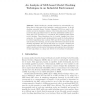Free Online Productivity Tools
i2Speak
i2Symbol
i2OCR
iTex2Img
iWeb2Print
iWeb2Shot
i2Type
iPdf2Split
iPdf2Merge
i2Bopomofo
i2Arabic
i2Style
i2Image
i2PDF
iLatex2Rtf
Sci2ools
182
Voted
CHARME
2005
Springer
2005
Springer
An Analysis of SAT-Based Model Checking Techniques in an Industrial Environment
Abstract. Model checking is a formal technique for automatically verifying that a finite-state model satisfies a temporal property. In model checking, generally Binary Decision Diagrams (BDDs) are used to efficiently encode the transition relation of the finite-state model. Recently model checking algorithms based on Boolean satisfiability (SAT) procedures have been developed to complement the traditional BDD-based model checking. These algorithms can be broadly classified into three categories: (1) bounded model checking which is useful for finding failures (2) hybrid algorithms that combine SAT and BDD based methods for unbounded model checking, and (3) purely SAT-based unbounded model checking algorithms. The goal of this paper is to provide a uniform and comprehensive basis for evaluating these algorithms. The paper describes eight bounded and unbounded techniques, and analyzes the performance of these algorithms on a large and diverse set of hardware benchmarks.
Related Content
| Added | 26 Jun 2010 |
| Updated | 26 Jun 2010 |
| Type | Conference |
| Year | 2005 |
| Where | CHARME |
| Authors | Nina Amla, Xiaoqun Du, Andreas Kuehlmann, Robert P. Kurshan, Kenneth L. McMillan |
Comments (0)

